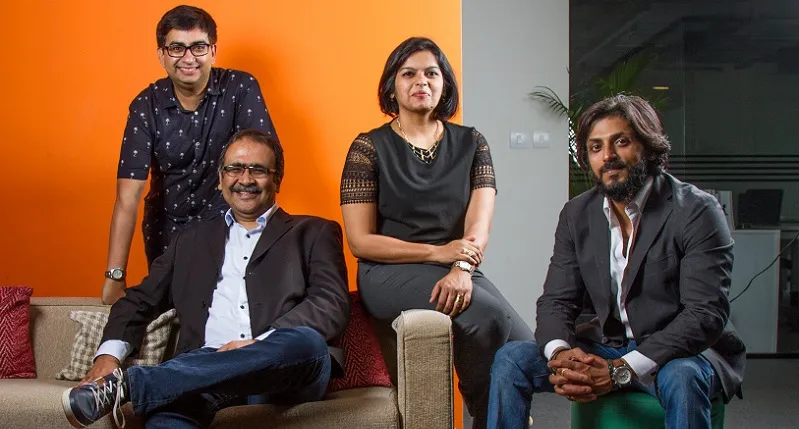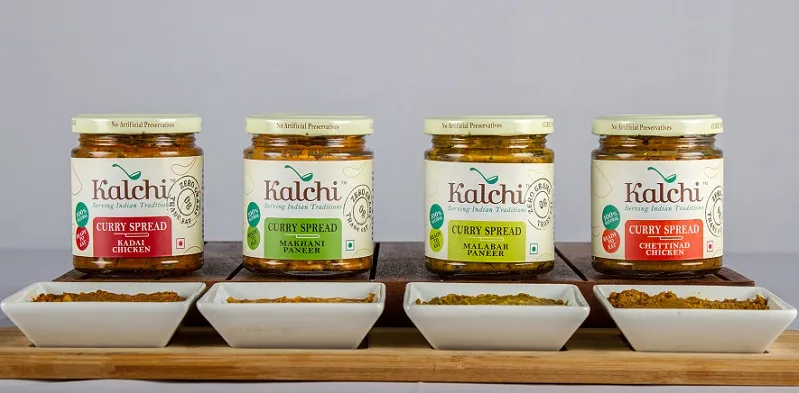Kalchi dishes out healthy, tasty, and quick Indian meal options for those on the go
Bengaluru-based Kalchi, which began in a test lab at a home kitchen, now sells its ready-to-eat products across 50 stores. The startup is planning a rollout to Mysore, Mumbai, Pune, Hyderabad, and Delhi-NCR by 2019.

At a glance:
Startup: Kalchi
Founders: Payal Srivastava, Sudeep Srivastava, Shashi Bhatia
Launched in: 2016
Based out of: Bangalore
Sector: Foodtech
Funding: Rs 2.5 crore
Payal Srivastava and her husband Sudeep Srivastava, both 39, had concerns in common with every working parent: identifying fresh, nutritious, tasty, and quick meal options for their children. Shashi Bhatia, their 52-year-old friend who stays away from family, was also in search of three easy, tasty, and nutritionally balanced meals a day.
After their corporate stints, the trio, with a cumulative experience of about 50 years of on strategic and leadership roles in infrastructure projects and telecom, decided to look into the FMCG space for a solution to this larger problem.
The beginning was at Decathlon centres across West and South India, where the trio’s sports startup was conducting archery training programmes. When an opportunity of setting up a health café at Decathlon corporate office-cum-store in Bangalore came up, they ventured into the food business. “Within a short span of time, we found ourselves operating six food outlets in Decathlon and across a few tech parks in Bangalore,” Payal recollects.
While interacting with customers they realised that there is gap in terms of availability of fresh packaged food which is free from preservatives, is authentic in taste, and has balanced nutrients. The popularity of their sandwiches and demand for the ready-to-cook/ready-to-eat variants at their food outlets helped the trio zero in on a product to develop and retail.
“We learnt that for majority of Indians, continental/world cuisine could only add variety and wouldn’t be a preferred regular option. Our focus therefore was on Indian food and here we are ‘serving Indian traditions’,” Payal says. Their venture was aptly named Kalchi, which in Sanskrit means serving spoon or ladle.
The trio was soon joined by a Aman Vasdev aged 37, an early believer and an investor, who also
decided to join the executive team as a full time member.
For a larger consumer base
Initially they set up a test lab at Payal’s home kitchen and began trials with an experienced chef they hired. They piloted by offering their products to people living in Payal and Sudeep’s housing complex at Yelahanka in Bangalore in November 2016. With phenomenal response from customers, Kalchi was formally launched in retail in August 2017.
Kalchi’s products are available across 50 stores in Bangalore, including Godrej Nature’s Basket, Food Hall, Spar, More, FoodWorld, Loyal World, and online grocery platform Bigbasket.com. They are soon launching their own ecommerce platform to reach out to a larger consumer base. Currently, they do direct selling in housing complexes, F&B events, and trade shows as well.

Kalchi’s target audience is in the age group of 25-45 years, and includes bachelors, mothers, young couples, nuclear families, double income households, and working professionals living away from families.
According to Payal, no other city would have been more conducive to start a consumer retail brand than Bangalore as it has the highest numbers when it comes to young working population, nuclear families, double income households etc.
“Unlike other cities, Bangalore has a cosmopolitan culture, always ready to experiment, high on adaptability. Moreover, Bangalore’s startup ecosystem is ever helpful and offers skilled manpower, which you need for a business like ours,” she says.
To promote the brand, Kalchi leverages social media for engaging with customers through high value content. As part of experiential marketing, their sales workforce makes customers sample Kalchi’s products and educates them on the value they offer. They directly obtain customer feedback on various parameters like taste, price, suggestions, repeat purchase, profiling, etc. from offline stores.
Innovation and competition
Kalchi has three product categories: Ready-to-eat curry spreads, ready-to-eat kebabs, and ready-to-cook marinated chicken. There are 12 SKUs:
- Four in curry spreads: Chettinad chicken, kadhai chicken, Malabar paneer, makhani paneer
- Two in kebabs: Veg shami kebabs, chicken cutlets
- Six in marinated chicken: Malai tikka, haryali tikka, lasooni tikka, achari tikka, tangri chicken, chicken lollypop
Many more SKUs are in the development stage and will hit the shelves soon.
In the spreads category, Kalchi competes with preservative-based, long-shelf-life spreads from Veeba, Funfoods, and Dr Otker. But Kalchi’s curry spread is a platform rather than a single product. It can be used to make an authentic curry by diluting with water. In that sense, Kalchi competes with ready-to-eat meals from ITC and Ashirwad.
Kalchi’s vegetarian curry spreads are priced at Rs 220 for 200 gm while non-vegetarian spreads are priced at Rs 240 for 200 gm. Although their revenue is driven mainly by offline sales now, Kalchi plans to build online channels by May 2018 and estimate sales to grow online then.
“We are currently selling around 200 products a day. A good number of customers are becoming repeat customers,” Payal adds.
Kalchi’s team of 15 people manages production, R&D, sales, and marketing functions. Currently, they manage logistics in house, but will work with cold chain logistics partners when expanding outside Bengaluru.
Broader horizons
Having started with a seed fund of Rs 2.5 crore, Kalchi is now in the process of raising external funding of about $5,00,000 to be used for capability building, brand building, product portfolio expansion, and business expansion in new territories.
Kalchi claims to be growing 40 percent monthly in terms of revenue. Their current monthly GMV is Rs 5 lakh and annual revenue rate (ARR) is Rs 60 lakh. The startup aims to break even in the next 12 months.
According to an ASSOCHAM survey, the major shift in food habits in metropolitan cities has resulted in about 79 percent of households preferring instant food. The steep rise in double incomes, standard of living, and convenience are added factors. The survey also found that 76 percent of parents in big cities, mostly both working and with children under the age of five years, are serving easy-to-make meals at least 10-12 times every month. This opens up vast avenue for Kalchi.
Kalchi is planning to expand outside Bangalore - in Mysore by April 2018, Mumbai and Pune by May 2018, Hyderabad by August 2018, and Delhi-NCR by March 2019.
Payal adds that they are getting enquiries from markets like the US, UK, Canada and the Middle East, thanks to the rising global popularity of Indian delicacies. Kalchi is targeting to spread convenience across a million homes by 2022 and simultaneously present Indian cuisine as neat and convenient to a global audience.







